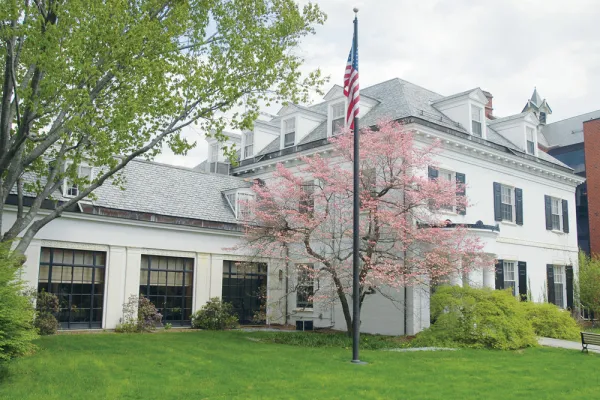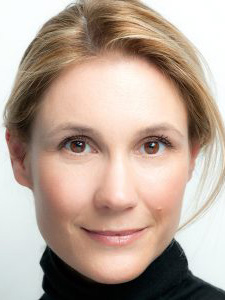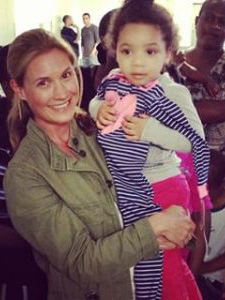Safe and Sound
Alum News

Published July 26, 2018
Footed pajamas for babies are not normally thought of as a life-saving device, but for infants in some of the world’s poorest countries and in certain areas of developed nations, that’s exactly what they can be.
 Sarah Bennison ’95, founder of premium children’s pajama company BENNISON, first learned about the crucial need for footed pajamas through a chance encounter with the director of a Burundi health clinic several years ago at a book party.
Sarah Bennison ’95, founder of premium children’s pajama company BENNISON, first learned about the crucial need for footed pajamas through a chance encounter with the director of a Burundi health clinic several years ago at a book party.
He explained to the crowd that many of the babies seen in the clinic, already medically compromised, were dying at night because of complications related to poor temperature regulation. Standard incubators weren’t an option because the clinic did not have the electrical supply to run them. While mothers were encouraged to keep their babies strapped to them during the day, it was too dangerous to do so overnight. Footed pajamas act like a personal incubator, trapping heat inside babies’ bodies.
Within days of learning about the need, Bennison had collected more than 300 pairs of new and gently used pajamas from friends, which she packed up for the Burundi clinic director to take back to his country. A couple of weeks later, he sent photos of babies in Burundi in the pajamas donated from the women of New York City.
“For me it became a tangible expression of the universality of motherhood,” Bennison says. “And it became a way of educating women here—as well as myself—about the kind of challenges that were going on around the world.”
Bennison sought to do even more for the clinic, which she visited in 2013. It needed an operating room among many other things and, instead of traditional fundraising, she tried to think of an innovative, sustainable method of giving. Using the footed pajamas as inspiration, she created BENNISON, a for-profit company that sells high-end pajamas handmade in Peru and donates a portion of its profits to maternal health projects.
Here she talks about creating BENNISON, its mission, and what she has learned so far.
BENNISON has donated more than 5,000 pairs of pajamas around the world.
 Talk about your business model.
Talk about your business model.
Initially, TOMS shoes was our reference point [TOMS donates a pair of shoes to a person in need for every pair sold], but we realized very quickly that the one-for-one model was not going to work economically or in terms of what people needed. The Pima cotton pajamas we were making and selling were too delicate for the needs of the babies receiving our donations. I eventually started calling us “TOMS with a twist.” Instead of selling one and giving one, we sell one and give 20 pairs of more durable pajamas.
Why did you decide to make the pajamas in Peru?
As I was thinking about developing my brand, I looked at the landscape of luxury pajama brands, which uses a lot of Pima cotton. Some of the most luxurious Pima cotton comes from Peru. Ultimately, I found a woman who has a very small company in Peru—a group of women—that makes children’s clothes. So, the cycle of giving begins with these women.
What is the goal of BENNISON?
The initial goal of the company was to provide long-term financial support to what I call our “giving partners,” specified clinics and nonprofit organizations. The profit piece to BENNISON was critical to this idea. Ideally, the sustainable giving wouldn’t be just centered on giving pajamas, but we would also generate funds to support maternal health in a global context.
How is the company doing?
I haven’t been able to generate enough profit to realize these bigger goals. But I’ve realized that I can continue to run the company with the focus being on giving pajamas.
Where else besides the Burundi clinic have you donated footed pajamas?
On our website there is a list of about 25 giving partners, places we have given pajamas. We give a lot locally. Through this work I was really shocked to learn that five miles from my house on the Upper East Side of New York is the poorest congressional district in the United States, the Bronx. So, I’ve given hundreds of pairs of pajamas to Bridge Haven, a transitional homeless residence. There’s the Native American Heritage Association, which serves several tribes in the South Dakota, Nebraska, area and also the migrant worker community in northern Michigan. Last summer, I went to Calcutta and I gave some pajamas there—so really all over the world.
Talk about the unique “Baby Care Wear” packaging that you use for donated pajamas.
The people at Gyro, a New York-based socially conscious ad agency, came to me with this soap packaging idea, which I just thought was brilliant. Many impoverished areas lack access to anything but communal bar soap to clean the pajamas, which actually spreads germs.
So, each donated pajama is wrapped in a package made entirely of water-soluble, non-toxic, biodegradable soap paper. All it takes is a bucket, water, and a small piece of the package to wash the pajamas.
Do you still accept donations of pajamas?
Yes, we still accept donations of new and gently worn children’s pajamas, sizes newborn to age 5. Information on how to donate can be found on my website.
How has your Smith experience helped you in this whole endeavor?
I think that the way that I was educated at Smith naturally evoked a sense of compassion and empathy. I left Smith with such a strong sense of social justice and a multiplicity of viewpoints.
How has BENNISON made a difference?
Since I started the company, I have given almost 5,000 pajamas to children in need around the world. I am proud that what started as a simple idea has become a powerful expression of connection between mothers and children that transcends the many boundaries that often separate us from those most in need. Pajamas are a small gift, but they meet a larger need in their embodiment of the care, compassion, and love present in the tender moments of bedtime. Recipients of the pajamas see that they are not forgotten, and this is as important as anything.